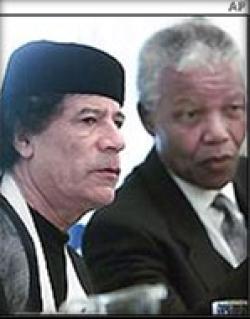
Published date
23 October 1997, 'Despite U.N. Ban, Mandela Meets Qaddafi in Libya' [online] Available at: www.nytimes.com [Accessed 22 August 2010]| Author, (unknown), 23 October 1997, 'Gadaffi my friend' [online] Available at: www.dispatch.co.za [Accessed 22 August 2010]| Author, (unknown), 22 October 1997, 'Nelson Mandela visits Libya, embraces Moammar Gadhafi' [online] Available at: edition.cnn.com [Accessed 22 August 2010]| Author, (unknown), 28 August 2001, 'Profile: Mandela's Magic Author, (unknown), 22 October 1997, 'South African President Nelson Mandela tried to solve the Lockerbie -Tragedy in Libya and in Scotland' [online] Available at: planetruth.com [Accessed 22 August 2010]| Plaatjie, T. (2006) 'The PAC in Exile', in The Road to Democracy in South Africa, Volume 2, 1970-1980, pg. 708, 733-734.| St. John, R.B (2008) 'Redefining the Libyan revolution: the changing ideology of Muammar al-Qadd', The Journal of North African Studies, Volume 13, Issue 1, (March 2008), pp. 91-106|